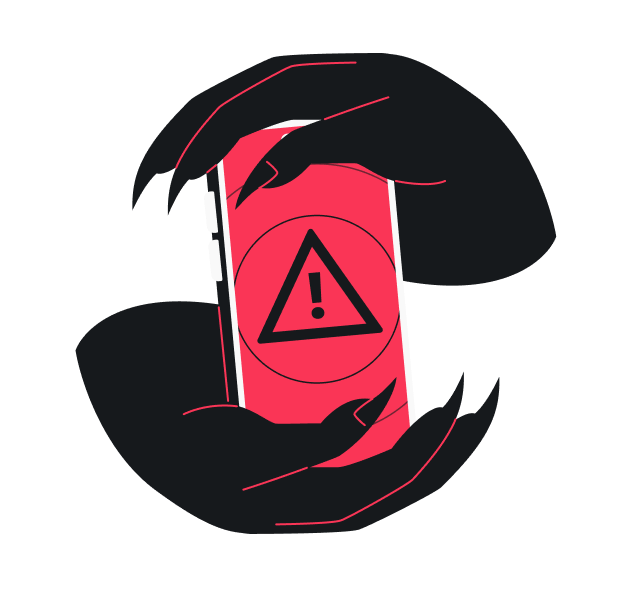Phone mirroring broadcasts what you see on your screen to another device. If done without your consent, it can reveal sensitive information — your private messages, passwords, and other personal data — to someone else. Unauthorized phone mirroring is a major invasion of your privacy and has to be stopped as quickly as possible.
Let’s dive into this topic so you can learn to recognize the signs of phone mirroring and take action to protect yourself.
Can someone mirror your phone without your knowledge?
There are several ways someone could be mirroring your phone without you knowing. Although not very common, this cyberattack can be achieved by exploiting your network or device’s vulnerabilities or having physical access to your phone.
Hackers, as well as people you know and trust, can use unsafe connections and malicious software to duplicate your phone’s activity and spy on everything you do without you being aware of it.
How can someone mirror your phone?
Someone could mirror your phone using one of the following methods:
- Malicious apps and spyware — cybercriminals might create spyware and screen-sharing apps disguised as harmless tools. Once installed on your phone, they can monitor and transmit your activities without you suspecting anything malicious;
- Unsecured networks — connecting to open Wi-Fi networks without additional security measures like a VPN can expose your device to hackers, allowing them to launch man-in-the-middle attacks — intercept your data and set up phone mirroring;
- Phishing attacks — bad actors may send you trustworthy-looking emails or messages and trick you into clicking on malicious links or downloading fake apps, providing unauthorized access to your phone;
- Physical access — if someone gets physical access to your phone — even a few moments alone with your device can be enough — they can install spyware or change settings to activate screen-sharing.
How to tell if someone is spying on your phone
Cybercriminals don’t make it obvious that they’ve gained access to your phone, so look out for such signs that might indicate your phone has been hacked and mirrored:
- Account activity — unusual logins and suspicious activity on your accounts (Google, Facebook, iCloud, etc.);
- Pop-ups — frequent false virus alerts and unexpected pop-up messages;
- Phone speed — your phone’s performance randomly slows down or lags;
- Reboots — your phone reboots unexpectedly without prior warning;
- Shutdowns — long, interrupted, or completely blocked shutdowns;
- Email delivery — spam emails are being sent from your account, getting blocked, or marked as spam by recipients;
- Screen activity — the screen lights up randomly when your phone is idle;
Interference — unusual interference with other devices during use; - Call noises — you hear strange noises during calls, such as static, echo, or tapping sounds;
Text messages — strange texts with unusual symbols or characters; - Battery performance — your phone’s battery drains rapidly or heats up when the phone is idle;
- App permissions — third-party apps requesting excessive permissions that are not typical for their functionality.
The risks and consequences of phone mirroring
Phone mirroring can be quite alarming. If you’ve never considered what could happen if someone were constantly spying on your smartphone, here are some significant risks to keep in mind:
- Loss of privacy — our daily communication often relies on chat messages and emails. If someone mirrors your screen, they can read every message you send and receive, making your private conversations no longer private;
- Compromised passwords — have you ever used the “show password” feature or noticed that the keyboard shows the characters as you type it in? If hackers mirror your phone, they could see and steal your credentials, putting your accounts at risk;
- Exposed gallery — all photos and videos you view on your phone are visible to anyone who is mirroring your phone as well. They could take screenshots and use them for blackmail or other malicious purposes;
- Reveal location and plans — if you’re using a maps application, anyone mirroring your phone can see your location and where you’re going. And if you’ve discussed your plans in texts, those details can also be exposed to anyone with access to your phone.
The good news is, you can take proactive measures to prevent these frightening scenarios. Read on to find some actionable tips on how to stop someone from mirroring your phone.
How do you stop someone from mirroring your phone?
Whether you own an Android or iOS device, you should follow these essential steps to stop phone mirroring:
- Run an antivirus scan — download and install reliable antivirus software or, if you already have one, make sure it’s updated and run a full system scan (Android users can access Surfshark Antivirus with One and One+ bundles);
- Enable Two-Factor Authentication (2FA) — protect your important accounts, especially your banking apps, by setting up 2FA. Choose a 2FA method that requires another device, such as a security key, instead of receiving a 2FA email or text to your phone. This will prevent hacking attempts, even if your phone is being mirrored;
- Change your passwords — assume any passwords you typed on a mirrored phone are compromised. Change your passwords using a different device (not your mirrored phone) to secure your accounts and prevent hackers from stealing the new credentials;
- Inform your contacts — let your contacts know about the hacking incident and to be cautious of any suspicious links and messages they might receive from you.
How to stop phone mirroring on Android
Let’s look at the ways you can stop mirroring on an Android device. Keep in mind that the exact steps may vary depending on the Android version and device manufacturer.
Disable Screencasting
- Open Settings.
- Type cast into the search bar.
- Tap Screencasting.
- Click on any devices you’re connected to and choose Disconnect or Stop Casting.
If you use the Google Chrome browser app, check whether Chromecast is enabled. Typically, it should be off unless you’re actively using it. If it’s on — disable it.
Manually delete any suspicious apps
- Go to Settings.
- Tap Apps or Applications.
- Find Manage Applications or Running Services.
- Check for suspicious or unfamiliar apps.
- Delete/uninstall any suspicious or unknown apps.
If you don’t know whether the app is legitimate or not, look it up online to see what the experts say about it.
Remove administrator access
There shouldn’t be many apps that have administrator access to your phone. Check which ones do and if you find any unfamiliar apps on the list — revoke their access.
- Go to Settings.
- Tap Lock screen and security.
- Navigate to the Other security settings.
- Select Device Administrators.
- Check if all apps that have access are legitimate.
- Revoke administrator access to any suspicious apps.
Clear your phone’s cache partition
Deleting the cache of your phone can help remove leftover data from previous infections. Here’s how you can wipe your phone’s cache:
- Turn off your phone.
- Open the Recovery mode: long press the Volume down and Power buttons simultaneously (for some models, you might need to use the Volume up button instead, or long press the buttons one after the other).
- Use the volume controls to navigate the Recovery mode menu and find the Wipe cache partition.
- Use the Power button to select it and once more to confirm.
- Restart/reboot the phone.
Factory reset your phone
Factory reset wipes all data from your phone and restores its software to the original state. It’s an effective way to stop any suspected malicious activity.
Before you begin, make sure all important data is backed up, and your phone is fully charged or connected to a charger.
- Open the Settings menu.
- Navigate to Reset options through the search bar or go to General management/System > Advanced (on some phones) > Reset options.
- Tap Erase all data (Factory reset).
- Choose Erase all data.
- If prompted, enter the security pattern, password, or PIN.
- Tap Delete all or Factory reset to confirm.
- Wait for the reset process to complete.
Reinstall your Operating System (OS)
Some hackers infect malware with “Factory Reset Detection,” allowing it to survive factory resets and remain on the device. If a malicious app has gained root access, a factory reset may also not be enough. In such cases, you’ll need to perform a clean OS reinstall on your phone to wipe the malware completely.
This process can be complex and risky, so it’s best to let a trained professional handle it. You can find experienced technicians at reputable phone repair stores.
How to stop phone mirroring on iPhone
Stop Screen Mirroring
While Screen Mirroring — the feature that allows you to cast your iPhone screen to a TV — is generally safe and unlikely to be used for spying on you, you might want to deactivate it anyway:
- Swipe down from the top-right corner of the screen to open the Control Center.
- Tap the Screen Mirroring icon.
- Select Stop Mirroring.
If you use the Google Chrome browser app, check whether Chromecast is enabled and disable it if it is.
Delete any suspicious apps
Look through your app library to see if there are any apps you don’t recognize and delete them.
- On the Home Screen, swipe left until you reach the App Library.
- Touch and hold the app icon you want to delete.
- Tap Delete App.
- Confirm by tapping Delete.
If you’re unsure whether the app is malicious, research it online.
Factory reset on an iPhone
Before proceeding with a factory reset, make sure to back up your files on iCloud. You should get a prompt suggesting to do so when you start the process.
- Go to Settings.
- Select General.
- Tap Transfer or Reset iPhone.
- Tap the Erase All Content and Settings option.
- Enter your Apple ID password.
- Wait for the phone to reset.
How to prevent my phone from being mirrored in the future
To protect your phone from being mirrored in the future, follow these online hygiene practices:
- Keep your phone updated — phone OS and app updates often include important security fixes, so regularly updating them can patch up existing vulnerabilities;
- Use antivirus software — antivirus can help detect malware or spyware that allows unauthorized mirroring of your mobile phone. Consider trustworthy services, such as AV-TEST-certified Surfshark Antivirus;
- Install trusted apps — only download and install apps from official sources, such as Google Play Store and Apple App Store. Check app reviews, ratings, and permissions. Don’t sideload apps from unknown sources, as they’re more likely to contain malicious software;
- Monitor your phone — set a strong password for unlocking your screen, lock your device when not in use, and don’t leave it unattended, especially in public places. Be vigilant about unusual phone behavior like an unexpectedly drained battery or appearing of unfamiliar apps;
- Be cautious online — avoid clicking on suspicious links, and don’t download any attachments from unfamiliar sources. Phishing attacks can trick you into installing spyware, so learn how to recognize phishing to not fall victim to it;
- Use a Virtual Private Network (VPN) — VPNs encrypt your data traffic, making it harder for hackers to intercept. This is especially important when connecting to unprotected public Wi-Fi networks.
- Set up multi-factor authentication — secure all possible apps and accounts with 2FA, such as security tokens or biometrics. It will provide an extra layer of protection even if your passwords are compromised;
By following these steps, you will significantly improve your phone’s security and reduce the risk of it getting mirrored or compromised in other ways.
In conclusion: phone mirroring is a threat that can be avoided
Phone mirroring can lead to financial loss, privacy violations, security threats, and other serious issues. However, you can take proactive measures to avoid that — keeping your phone updated, using trusted apps, staying vigilant, and following the best online hygiene practices. So, how about starting with a VPN?
To help you make up your mind, take a look at this Surfshark review and learn about its benefits.
FAQ
Can you stop someone from mirroring your phone?
Yes, you can prevent phone mirroring by taking these steps: disable screen casting, delete suspicious apps and files, run regular antivirus scans, and, if necessary, perform a factory reset or reinstall the OS.
Can someone mirror your phone without you knowing it?
Yes, it’s possible to mirror your phone without you knowing it. Hackers can install malware — for example, if you accidentally download an infected file — that mirrors your phone without alerting you.
If someone has physical access to your phone, they can install malicious software directly to your device and start mirroring without your knowledge.
How do I know if my phone is screen mirroring?
There are several signs of your phone screen being mirrored:
• Your phone battery dies faster than usual;
• There’s an increase in your mobile data usage;
• You notice phone interference when you’re not calling anyone;
• You experience difficulty shutting down the phone;
• Your phone screen light-ups randomly when not in use.





